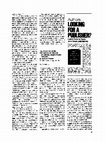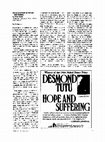Papers by Ralph Buultjens

Worldview, Jul 1, 1982
The historical rehabilitation of Dwight D. Eisenhower continues. The nation's thirty-third chief ... more The historical rehabilitation of Dwight D. Eisenhower continues. The nation's thirty-third chief executive, Burton Kaufman tells us in his new study of American foreign economic policy in the 1950s, was "an activist president with a keen and cogent intellect." In addition, he was "a political leader of considerable talents" who, at least in economic matters, overshadowed his forceful secretary of state, John Foster Dulles. Moreover, Eisenhower was personally responsible for laying down important new directions for the conduct of American foreign policy: he reoriented the mutual security program away from military aid and toward a new emphasis on economic assistance; he played a key role in shifting U.S. foreign aid from the industrialized countries to the developing world; he dragged a reluctant Republican party into accepting the reciprocal trade program; and he initiated multilateral and regional efforts to promote economic growth abroad, efforts that his successors would continue and enlarge. And yet, despite these accomplishments, Kaufman finds the predominant theme of American foreign economic policy under Eisenhower to be one of unfulfilled hopes. Eisenhower entered the White House in 1953 intent upon eliminating foreign aid altogether and relying on expanded trade and private investment to meet the world's economic needs. Eight years later he left office with the United States much more deeply involved in providing financial assistance to nations all over the globe. And for what? According to Kaufman, the administration failed to bring about the significant economic and political changes it had anticipated. American dollars liberally distributed throughout the Third World had fostered neither stability nor democracy nor increased receptivity to Washington's foreign policy objectives. One of the most important reasons for these dashed hopes-and this is where Kaufrnan differs with some of the Eisenhower revisionists-lay in the way in which the president and most of his advisers envisioned the question of foreign aid. Indeed, the entire debate over foreign economic policy was "circumscribed and narrowly conceived," as a single-minded anticommunism distorted the purposes of much of the program. Equally pernicious in undercutting the potential effectiveness of American assistance was the easy but erroneous assumption that economic growth would automatically promote political liberalism and other Western values in Third World countries. Historians will read this book with gratitude to Kaufman for undertaking this important, timely, and oh-so-treacherous topic. In some respects his study is perhaps too narrowly focused; one learns much of decision making in Washington, but almost nothing of the impact which American policies had overseas. And until the State Department materials for this period are opened, one will inevitably get the view as seen from the White House, rather than from Foggy Bottom or from U.S. diplomatic missions abroad. Even so, this volume is the product of extensive research into the available archival collections-principally but not exclusively those at the Eisenhower Library-and should be of use to all scholars interested in the interplay of economics and diplomacy.
Journal of Interdisciplinary History, 1995
An Introduction to Global History (Bruce Mazlish.) The Theory of Global History The Rounding of t... more An Introduction to Global History (Bruce Mazlish.) The Theory of Global History The Rounding of the Earth: Ecology and Global History (Neva R. Goodwin.) Global History: Historiographical Feasibility and Environmental Reality (Wolf Schfer.) Global History and the Third World (Ralph Buultjens.) From Universal History to Global History (Manfred Kossok.) Global History in a Postmodernist Era? (Bruce Mazlish.) Applied Global History Migration and Its Enemies (Wang Gungwu.) A Globalizing Economy: Some Implications and Consequences (Richard J. Barnet and John Cavanagh.) Human Rights as Global Imperative (Louis Menand III.) The Globalization of Music: Expanding Spheres of Influence (John Joyce.) An Overview On the Prospect of Global History (Raymond Grew.).
Ethics & International Affairs, Mar 1, 1992
Buultjens addresses the problem of integration and fragmentation in considering the cyclical patt... more Buultjens addresses the problem of integration and fragmentation in considering the cyclical patterns of democracy and the question of whether or not his most recent democratic moment will hold. His work builds on a basic question as to how citizens and leaders can “adhere to the middle of the road paved by traditional values when the course of history is moving groups and nations toward narrowly defined, self-serving solutions.” He finds some reasons for optimism in the new political realities that are potential sources for constructive integration. He discusses the future prospects for democracy by asking whether the present “democratic starburst” can be translated into durable systems and working institutions.

Worldview, 1984
land they worked." This book is further testimony to Lenin's indomitable revolutionary spirit and... more land they worked." This book is further testimony to Lenin's indomitable revolutionary spirit and to his relentless, single-minded pursuit of victory over the tandem devils of czarism and capitalism. In this pursuit Lenin was alternately more rigid and more flexible than his opponents inside and outside of the RSDP. Ever the quintessential zealot, he played fast and loose with the orthodox canons of Marxism even as he attacked more moderate Russian socialists as traitors to the Marxist cause. Above all, Lenin found a way to reconcile the abstract requirements of an alien, industrial ideology with the concrete realities of a rustic, rural society. Whereas "the debilitating burden which the Marxist tradition had imposed upon the Russian revolutionary activist" induced a paralysis of will within the Menshevik ranks, Lenin was able to devise a creative interpretation of Marxism that incorporated the peasantry into his blueprint for revolution-and not just a "bourgeois-democratic revolution" but a "revolutionary-democratic dictatorship of the proletariat and the peasantry." Lenin was not content to settle for half a loaf when there was even the slightest chance of having the whole thing. The peasantry; he argued, could be a truly revolutionary force if it was led by politically advanced cadres. In asserting that the class consciousness of the peasants could be raised above the "bourgeois" level, Lenin showed his true colors. Far from being a determinist, he was one of the twentieth century's most fervent believers in voluntarism. After 1905-06, Lenin had argued that, with the Bolshevik party at the controls, the bourgeois-democratic revolution could be directed onto progressive paths. Later, in the heat of revolutionary battle, when czarism had fallen and the fainthearted bourgeois politicians were backsliding, Lenin argued that with the help of the peasants the proletariat-guided by their "vanguard" members-could push the bourgeois-democratic revolution directly into a socialist revolution. Lenin was not one to let ideology stand in the way of history. There is rich irony in the fact that although Marxists have never known what to do with the peasantry, the setting of every successful "Marxist" revolution has been a rural society in which the numerically dominant class of exploited "workers" were peasants tilling the soil, not proletarians manning the assembly lines. It is no accident that the two towering "Marxists" of me present century are Lenin and Mao, both of whom seized the opportunity to make a revolution using the peasants as dry tinder.

Worldview, 1985
Modern global colonialism was largely a European invention. For over four centuries, beginning in... more Modern global colonialism was largely a European invention. For over four centuries, beginning in 1500, a few small European nations appropriated the bulk of our planet and ruled it as a kind of international fiefdom. Aided by superior naval and ordnance technology, inspired by economic greed mixed with cultural and Christian expansionism, they seized, bought, and lost vast territories. The imperial enterprise became the single most important venture in world affairs. By 1914 people of white European stock had occupied or ruled four-fifths of the earth. In this process, they changed global economics and political life, and changed themselves, too. Territorial acquisition brougfft prosperity and fueled the Industrial Revolution. Then two world wars began a massive rollback. Empires dissolved and new nations were born. A whole Third World was created in the two decades after 1945.
Worldview, 1984
anity, the attitude of the Sandinista government toward the Church, and the role of the contempor... more anity, the attitude of the Sandinista government toward the Church, and the role of the contemporary Church in social change and social justice. All three men are convinced that Marxism and Christianity are compatible, that the Sandinista revolution is a Christian revolution, and that the gospel of the Church implores its priests to be activists for social change and social justice. The sentiments are summed up by d'Escoto, a Maryknoll priest bom in the United States of Nicaraguan parents: "I'm a priest-a missionary priest, essentially. I travel for the cause of peace, justice, and the dignity of my people." The powerful, though simple, words of these priests bear moving witness against the U.S. administration's claims of the Sandinista grand design to extend atheistic communism up the coast of Central America. MS\
This repository item contains a single issue of the Pardee Conference Series, a publication serie... more This repository item contains a single issue of the Pardee Conference Series, a publication series that began publishing in 2006 by the Boston University Frederick S. Pardee Center for the Study of the Longer-Range Future. This was the Center's spring Conference that took place during April 1, 2, and 3, 2005.
This repository item contains a single issue of the Pardee Conference Series, a publication serie... more This repository item contains a single issue of the Pardee Conference Series, a publication series that began publishing in 2006 by the Boston University Frederick S. Pardee Center for the Study of the Longer-Range Future. This was the Center's Inaugural Conference that took place during November 8, 9, and 10, 2001. Organized by David Fromkin, Director Frederick S. Pardee Center for the Study of the Longer-Range Future. Co-Sponsored by Boston University and Carnegie Council on Ethics and International Affairs.
This repository item contains a single issue of the Pardee Conference Series, a publication serie... more This repository item contains a single issue of the Pardee Conference Series, a publication series that began publishing in 2006 by the Boston University Frederick S. Pardee Center for the Study of the Longer-Range Future. This was the Center's 2nd annual Conference that took place during November 14, 15, and 16, 2002.
Worldview, 1982
In the early 1970s the international relationships that had been frozen since soon after World Wa... more In the early 1970s the international relationships that had been frozen since soon after World War II showed signs of decongealing. Sensing the historical moment, the Nixon administration aspired to be both the catalyst and the beneficiary of this time of rare opportunity. As national security assistant and then secretary of stale, Henry Kissinger was uniquely situated to participate in, shape, and observe these efforts. The first volume of his memoirs, White House Years, detailed his part in the early Nixon period, January. 1969, to January, 1973. Now he continues the story in a weighty second volume. Years of Upheaval (Little. Brown; 1,283 pp.; $24.95) takes us from 1973 to the Nixon resignation in August, 1974.
Uploads
Papers by Ralph Buultjens